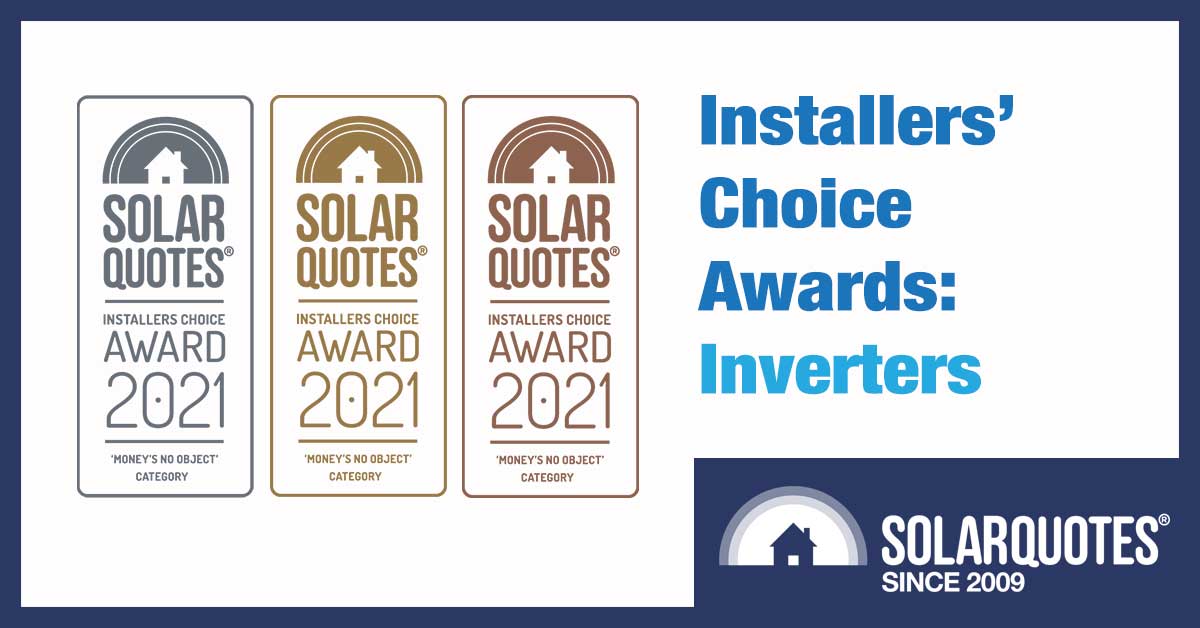
There are a lot of solar inverter brands on the Australian market in 2021. But which ones are the best?
That’s a tough question to answer. So we asked installers we trust what they thought.
As we did when gauging what they considered the best solar panels in 2021, we asked all the installers in our network two questions and counted the votes.
—
UPDATE March 14, 2022 – see which brands installers picked as the best solar inverters in 2022.
—
SolarQuotes Installers’ Choice Awards For Inverters: 2021
To try and tease out which solar inverters installers consider the absolute best in terms of performance, features and build quality compared to the best value for money, we asked 2 separate questions:
- What solar inverter brand would you put on your own house if money was no object?
- What solar inverter brand would you put on your own house if money was tight?
The results are a good way to help the average person understand which inverter brands installers rate highly when only the best will do – and just as importantly – which inverter brands they trust to last well past the warranty period when funds are tight.
Note: Choosing good brands is very important when buying solar for your home or business. But of equal importance is ensuring the system is well installed. The difference between a good and crap solar installation is night and day. Please – never skimp on the installation.
Best High-End Solar Inverters in Australia (Money No Object):
We asked the installers:
What solar inverter brand would you put on your own house if money was no object?
Here’s what they told us their favourite ‘high-end’ inverters are:
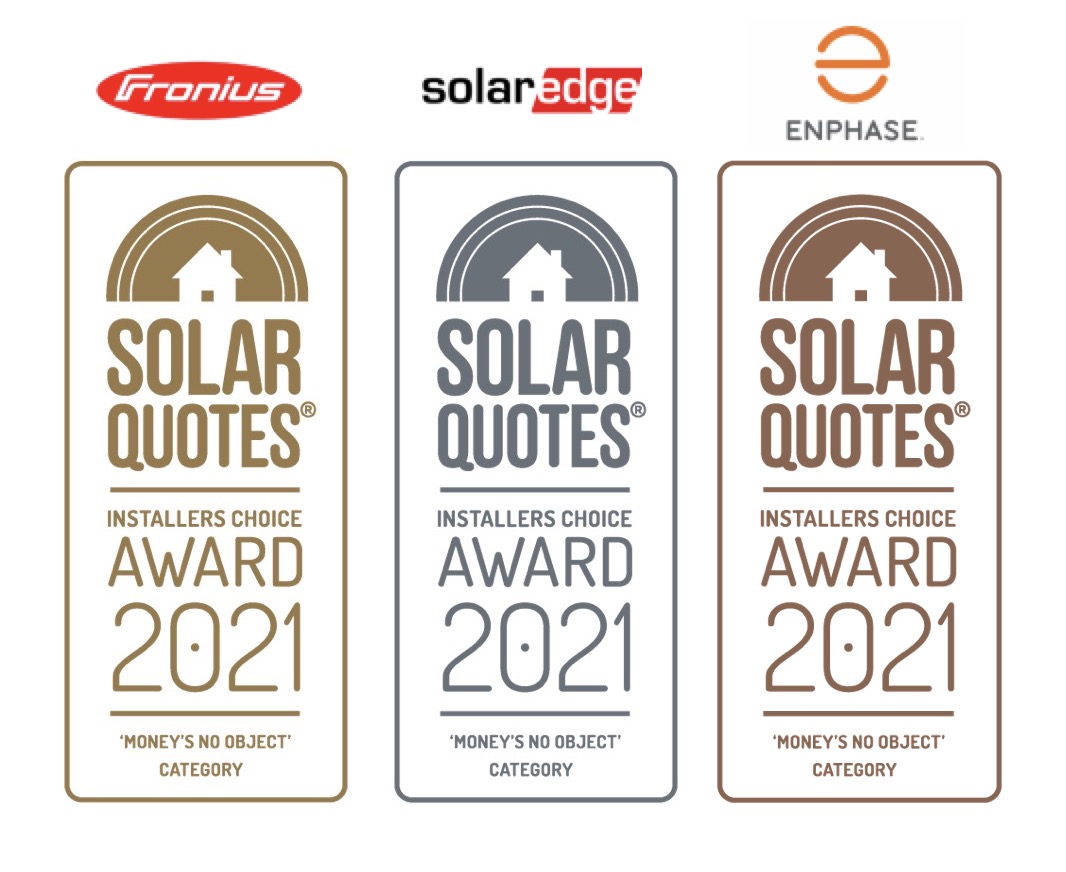
The top 3 high-end solar inverter brands in Australia for 2021.
First Place: Fronius (28.85% of votes)
This would be no surprise to anyone in the Australian solar industry. Over the last decade, Fronius has stormed the Australian solar market and become a firm favourite of homeowners and installers alike. Fronius had a rough start in Australia as some of their IG series inverters had a high failure rate many years ago. But to their credit, Fronius engineers found the weak point in those inverters and replaced any failed cards that popped with a more reliable design.
But it was the introduction of their bulletproof and cleverly designed ‘SnapINverter’ range that took them from almost zero to hero in the Australian market, and they haven’t looked back since. Their latest inverter is the ‘GEN24‘ (which is not the 24th generation – but is a hybrid inverter for ’24 hours of sun’).
Fronius has just revealed this new inverter range will soon be available to buy at a discount – with the hybrid features disabled. If you want to add a battery, you pay a fee, and Fronius unlocks the hybrid function.
One disadvantage of Fronius inverters: they can be noisy. Fronius insists on active cooling as its engineers believe this is essential to longevity. Unfortunately, this means a fan that can get really noisy when the inverter is working hard. The ‘GEN24’ inverters are quieter but may still be too noisy for some.
Second Place: SolarEdge (27.88% of votes)
SolarEdge only lost to Fronius by one vote. So, it seems they are well-loved by Australian installers. One thing that I can’t deny is SolarEdge is a very polarising brand in Australia. Installers seem to either love them or hate them.
SolarEdge inverters must be used with an optimiser on every panel. This optimiser gives each solar panel its own multi power point tracker (MPPT), which is useful where there is shade on some panels or if the roof is complicated. SolarEdge also has some clever hybrid inverter designs and was the first inverter manufacturer I know of to integrate an EV charger.
Third Place: Enphase (20.19% of votes)
Enphase is unique in that they are the only microinverter manufacturer of note who sells in Australia. Their systems have many advantages over string systems, such as safer voltages and fault tolerance.
Their big disadvantage: they cost a motza. Many years ago, Enphase promised they’d get microinverters as small as an iPhone and lower cost per watt than string inverters. That never happened. But they are still highly regarded for their flexibility and reliability, with some installers so enthralled, they are refusing to sell anything else.
Here’s how all the votes were cast:
Best Budget Solar Inverters in Australia (Every Dollar Counts):
We asked installers:
What solar inverter brand would you put on your own house if money was tight – and every dollar counts?
Here’s what they told us their favourite budget inverters are:
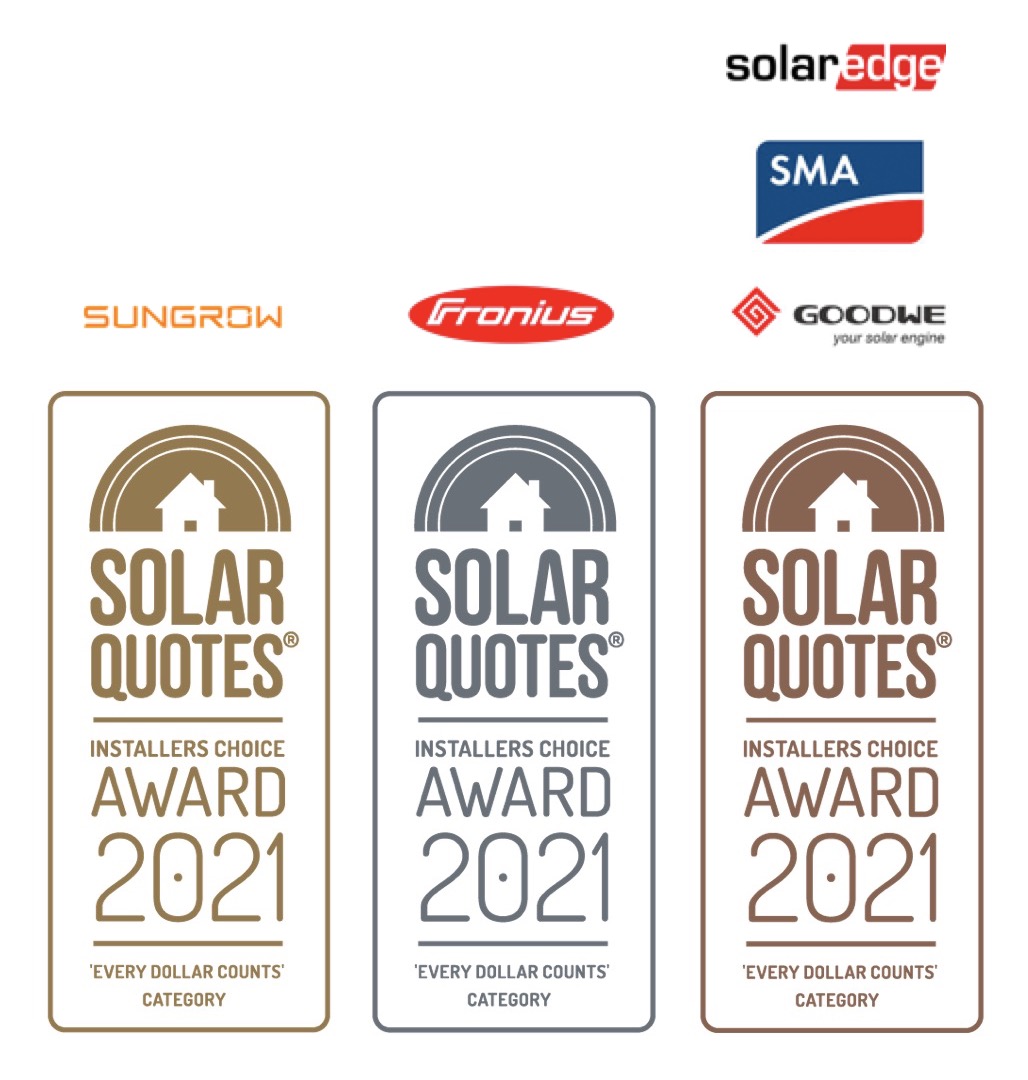
The top budget inverter brands in Australia for 2021. The strange thing is, Fronius SMA and SolarEdge are not budget brands! What’s going on?
First Place: Sungrow (35.79% of votes)
Sungrow absolutely thumped the competition for best budget inverter, winning by 19 votes. And they deserve to. Their 5 kW inverter wholesales for almost half the price of a Fronius, and the Sungrow is well built, has excellent Australian tech support and some great features such as integration with Solar Analytics.
Second Place: Fronius (14.74% of votes)
This is a weird one because Fronius don’t make budget inverters. So what’s going on? I’ll tell you! Many installers in Australia do not agree with the concept of a budget inverter. Here’s one example comment we got back with the survey:
“If money was tight I wouldn’t be fussy about the panel brand. But I wouldn’t compromise on the inverter.”
It seems many installers recommend a Fronius no matter what your budget.
Joint Third Place: Goodwe, SolarEdge and SMA (10.53% of votes)
Goodwe is a budget inverter brand with a good reputation for reliability and features. But what are premium brands SolarEdge and SMA doing here? This comment from an installer helps explain SolarEdge also appearing in the budget category:
“If shading was a problem I would use Enphase IQ7A as my premium choice and SolarEdge as my less expensive option.”
The other reason is SolarEdge and SMA have a solid following in Australia and some installers can’t bring themselves to install anything else.
Here’s how all the votes tallied:
So there we have the best solar inverters in Australia in 2021, as voted by installers. Here on SolarQuotes, you can also check out thousands of solar inverter reviews from Australian customers.
NEW: Installers vote for their favourite solar battery brands in 2021.

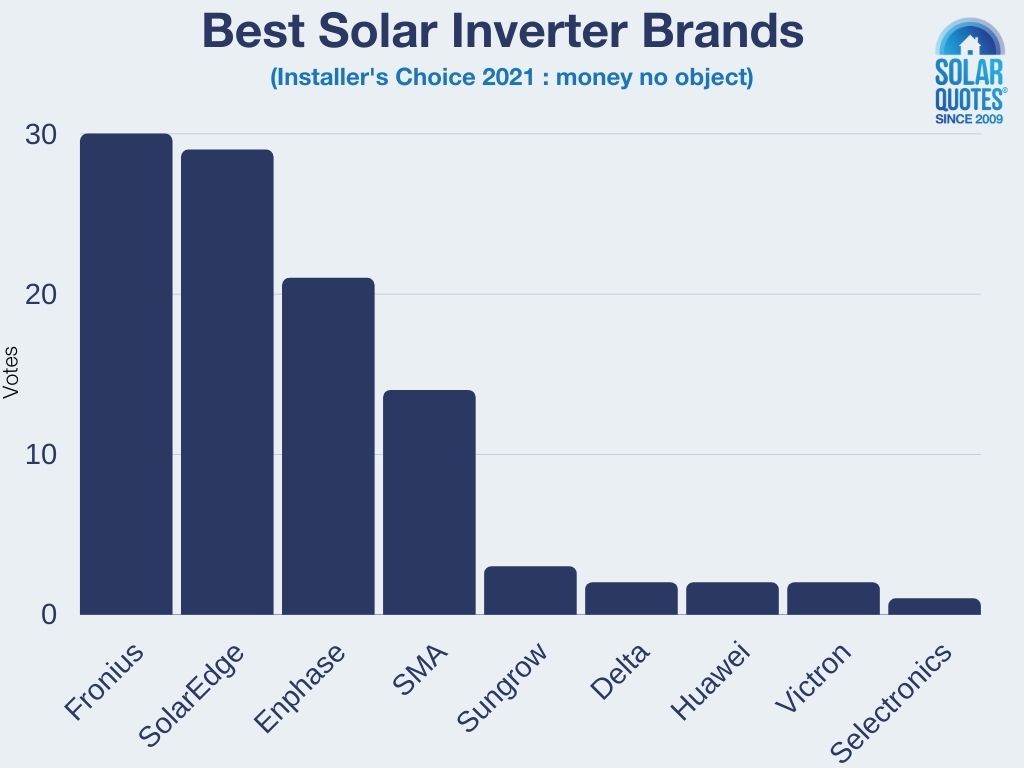
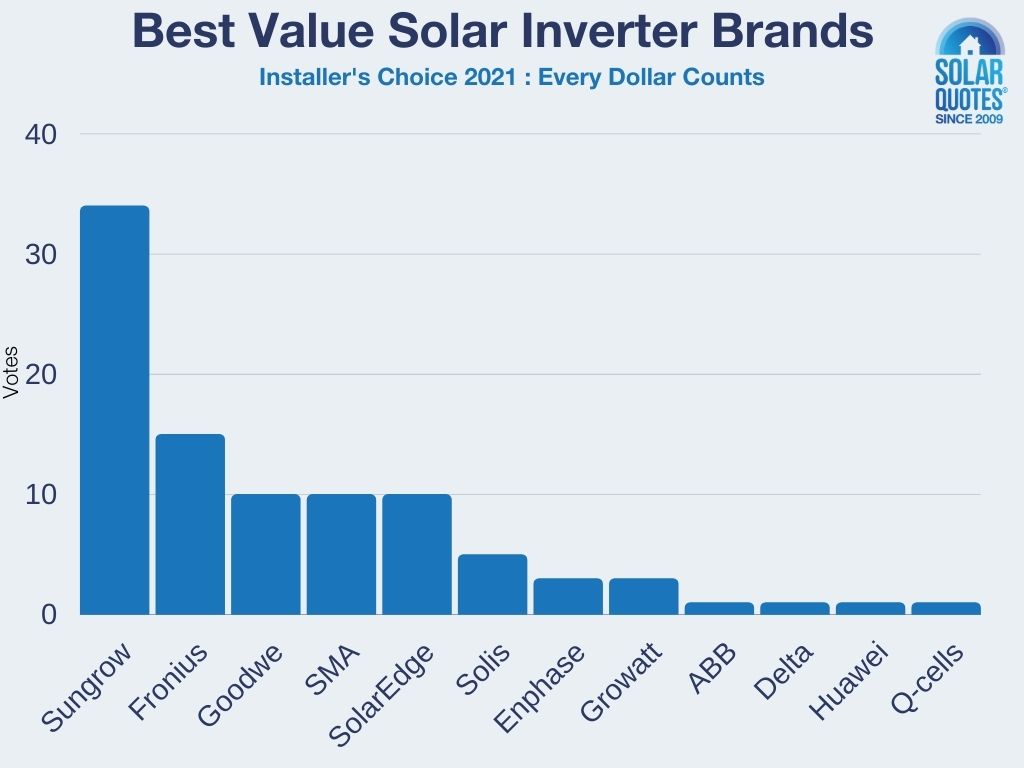
 RSS - Posts
RSS - Posts



I have a 13 year old Fronius that hasn’t missed a beat
And a Sungrow hybrid on a rental that did miss a beat but between the sparky and customer service was quickly sorted
So, happy with these results
Your opinion of micro-inverters and reliable brands, Finn? Looking at Alpha, as our forest site is shaded for much of the day.
Fortunately, given WA’s new DEBs scheme, half the panels we’re considering will be facing west… .
Hi, fellows I have just installed a “MUST “brand of Chinese made inverter 5.5kw hybrid to say. With utility power input
And a change-over switch,could not get any juice out from the inverter when on utility supply.any suggestions?.
I don’t think that model of inverter is approved for use in Australia. If you’re not in Australia, we probably can’t help you because different countries have different standards. But if you’re a fair dinkum Australian no probs cobber — just take a squiz at the inverter and tell me the model number and she’ll be right.
We have a Fronius Symo three-phase 5kW inverter and the inbuilt Datamanager, production data over the web and fan is the reason I chose Fronius. The Fronius is in the garage and I do not think the fan is noisy, but in our climate essential for the electronics. Judging by the “bait and switch” ads for single-phase Fronius and Jinko 370W panels (6.6kW), I probably paid close to $1,000 more.
The Datamanager has the smarts to drive a relay to switch on the H/W system or pool pump on the basis of production. So instead of getting a lousy 3c/kWh (WA) for export, when production reaches a specified value, the relay will be triggered on for x minutes, switched off at y Watts and you can specify min/max durations/day, the desired duration and when it is to be finished by.
The app called Solarweb has given me realtime production data for a while, but no more, that is the only fly in the ointment at the moment. My WiFi has a strong signal, I have Internet access, claims site Fronius_240xxxx is encrypted and connected, but no Internet access! Help!
Fronius tells me to contact the installer (Koala Solar), but he is asking me for the inverter’s error code, of which there is none. I hope Fronius is going to help me with a reply and solution. Is trying to sell me “Premium” related to this outage? A competitor has hinted that Fronius will want to be paid for production figures over the web?
Dominic mentions that his Fronius Inverter is inside the garage. What if it is near the meter box exposed to the elements? Do you think it requires a cover to protect it from the elements and potential thiefs?
I have a SolarEdge system with LG panels 9KW and it has been excellent, we had a few issues at the start as SolarEdge Australia support were not aware that the main inverter input for each set of Panels (inverters) only handles 6KW so the sparky had to rewire the panels to be in two groups. I love the App as you can see production and usage. Overall well happy.
I have a Growatt and it seems pretty good actually with decent monitoring software and not loud at all. Same warranty as Fronius offers as well.
What about country of origin? I won’t touch anything from China given the current political situation and the questionable quality from these people. My insurance company agrees…
Chinese people are just people. The quality of the goods produced depend on the circumstances under which they are working. Some companies in China produce good quality products, others produce absolute rubbish. It is useful to view companies individually and not regard them as all bad because they share a nationality.
I have the same query, and it’s not about the people it’s about the corrupt government committing atrocities on the people. Not to mention the fact that I have never found a quality product that was manufactured in china.
My comment about the Chinese was not about the ordinary “people” I WAS referring to the politicians and in particular, the PLAN (Military) who actually own any business/industry of any importance in China. To buy any product or service from China, only serves to enrich and enable Chinese military planning to wage any future aggression “these people” may have in mind for their own purposes. To support this by buying Chinese product may even be construed as “acting to the detriment” of our country. Think it through…you may have a real moment…
Mikemack
Well Finn, I quess I am Australian, give the underdog a go??
I have YC600 APsystems micro inverters.
I had them installed 18 mths ago,and but for one software glitch,which was fixed remotely from Sydney, have performed faultlessly.
These inverters are a totally different kettle of fish compared to their predecessor, the YC500, which did have problems.
My reasons for this preference compared to the Enphase Q7 is that they start at a lower level and produce 300 against 265 watts.
My system is 9.66Kw 370w panels with APS micro inverters.
The wifi programme reporting is very good and easy to use.
I think this product deserves more recognition than currently afforded it.
@Bruce Merrin,
I find your comments interesting. I also live in Adelaide and I’m considering purchasing a solar system soon. May I ask, are you still happy with the AP System YC600 inverters? And who did you purchase your package from? I can’t seem to find many reviews on AP Systems and no one I’ve approached so far has quoted me for AP Systems.
Generally speaking Mikemack’s comments seem true. There is lot of bad stuff comes out of that place, and so its hard to sort through good stuff amongst it. That’s why the reviews like this help identify good products made in that place.
Hi Finn,
We are residing in Adelaide. We chose Trina x 18 Panels (370) with Fronius inverter 5,0. What’s your suggestion about these combination pls? I heard that Fronius inverter is noisy? Is that true? Thankyou.
Hi Colin, Ronald here.
Trina are a lower cost panels we consider to be reliable and we consider Fronius to be a high quality inverter. Provided this hardware is installed by someone who does good quality work it should operate reliably for a long time. Unfortunately, Fronius inverters can be noisy because they have an external fan, so it’s best to locate them away from living areas. The fan can reach 65 decibels, which is around the level of a conversation.
I have Trina panels (400w) and 8 kw fronius. The combination seems to be working ok though we’ve only had it for a few weeks. We don’t hear our fronius inverter at all, so don’t think it’s that noisy.
Hi Colin,
Andrew here.
How long have you had this combination of solar system?
How’s their performance?
I’m also interested to put this up.
thanks you